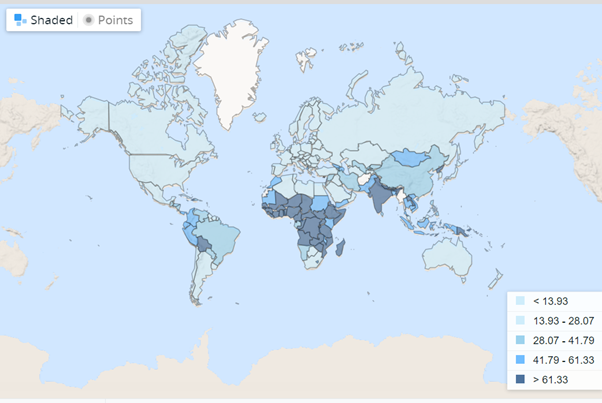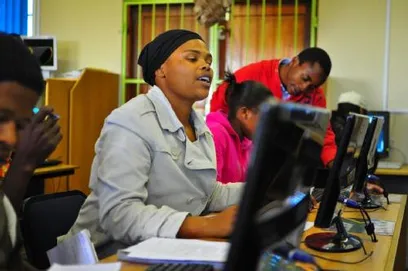IER News & blogs
Observing World Youth Skills Day: Reflections from research in Sierra Leone - Blog by Jamelia Harris
 World Youth Skills Day recognises the strategic importance of providing young people around the world with the necessary skills for employment, decent work and entrepreneurship. July 15th was first declared World Youth Skills Day by the United Nations General Assembly in 2014 and has been celebrated each year since. This year, the theme centres on “Skilling teachers, trainers and youth for a transformative future.”
World Youth Skills Day recognises the strategic importance of providing young people around the world with the necessary skills for employment, decent work and entrepreneurship. July 15th was first declared World Youth Skills Day by the United Nations General Assembly in 2014 and has been celebrated each year since. This year, the theme centres on “Skilling teachers, trainers and youth for a transformative future.”
Training and skills development among youths better equips them "to build a prosperous and sustainable world" and helps to ensure no one is left behind. The UN estimates that the youth population will grow by more than 78 million between 2021 and 2030, with nearly half of this growth taking place in low-income countries. Education and training systems need to respond accordingly. And they have been doing so, to some extent.
Policies, skills, and jobs
Both developed and developing countries have conveyed skills development as a priority focus and have been investing in skills development and training. The OECD has outlined key skills strategies and both governments and development partners have articulated skills development as a top policy in developing countries. Despite this prioritisation, translating skills into employment and earnings and has not been so straightforward in many countries. Recent estimates suggest that 600 million jobs would need to be created over the next 15 years to meet the employment needs of young people. In 2022, the total number of unemployed youths globally was estimated at six million above the pre-pandemic level of 2019, and most recent global data (2020) on the share of youths not in employment, education, or training (NEET) showed a 23.3 per cent increase, reaching the highest level since 2005.
These issues are particularly acute in developing countries. Many still cannot find work, and this is particularly the case among youths. According to World Bank data, the majority of workers in low-income countries are in vulnerable employment (Figure 1). Some scholars have even questioned the value for money of skills development programmes by the international development community. “Teaching a man to fish” is necessary, but not sufficient to ensuring post-training employment. Indeed, as a recent NORRAG Special Issue highlights, the discontinuities in the Education-Training-Work-Continuum are multifaceted. My research on Sierra Leone, a low-income developing country, suggests a combination of factors contribute to these discontinuities.
Figure 1: Vulnerable employment as a percentage of total employment, 2021

Image source: World Bank
Lessons from Sierra Leone
First, interviews with stakeholders revealed a lack of consensus on what the term “skills” means. The conversations mirrored decades old academic discussions on the differences between, competencies and qualifications, and how each of these interact with the concept of skills. This is important as youth perceptions on what it means to be skilled (which was mainly academic in nature) and subsequent investments in training, did not align with employer demands for more applied vocational skills and training, and in some cases demands for more cross-sectoral skills (like communication skills, etc).
Second, there is limited participation of local stakeholders in the technical and vocational education and training (TVET) arena. In Sierra Leone, TVET training tends to be heavily driven and financed by donor partners. Private sector companies, and even the government at times, were absent from the table and thus provided little to no input into the content of some TVET programmes. Against this backdrop, it was unsurprising, that after nearly two decades of post-war skills development interventions, companies still reported skills shortages in areas like carpentry and welding, despite various non-governmental organisations (NGOs) and international government organisations (INGOs) providing short courses in these areas.
Third, skills training geared towards entrepreneurship provide useful skills, but often capital constraints limit successful transition to formal entrepreneurship. Respondents described a “missing middle”, where some entrepreneurial projects where too large to benefit from financial support offered to micro- small and medium enterprises (MSME), but too small to access on-lending agreements designed for large companies.
 The final issue lies on the demand side of the labour market, and is arguably the most difficult to tackle in developing countries as it relates to structural issues. Several manufacturing companies interviewed cited that import liberalisation policies lead to more imports and lower demand for some locally produced goods. This in turn limits output and demand for workers, ceteris paribus. Further to this, high non-labour costs of production (e.g., electricity and transport costs) reduce the competitive advantage of some firms and increase the price of their products relative to imports. Sierra Leone ranks 163 out of 190 countries in the World Bank’s Doing Business Index, which gives an indication of the ease of doing business. Most of the bottom 50 countries in the index are in Sub-Saharan Africa. Added to this, many of these countries are fragile (either in or post-conflict), and most still grapple with colonial legacies that affect the structure of economic, political and social institutions.
The final issue lies on the demand side of the labour market, and is arguably the most difficult to tackle in developing countries as it relates to structural issues. Several manufacturing companies interviewed cited that import liberalisation policies lead to more imports and lower demand for some locally produced goods. This in turn limits output and demand for workers, ceteris paribus. Further to this, high non-labour costs of production (e.g., electricity and transport costs) reduce the competitive advantage of some firms and increase the price of their products relative to imports. Sierra Leone ranks 163 out of 190 countries in the World Bank’s Doing Business Index, which gives an indication of the ease of doing business. Most of the bottom 50 countries in the index are in Sub-Saharan Africa. Added to this, many of these countries are fragile (either in or post-conflict), and most still grapple with colonial legacies that affect the structure of economic, political and social institutions.
Photo by BeyondAccessInitiativeLink opens in a new window licensed
Ways forward
In observing World Youth Skills Day this year, we should reflect on the need to train and upskill young people. The need is particularly pressing in developing countries. However, skills training and development is just one part of the puzzle in ensuring decent work for all. The demand side of the labour market is critical, and so too is relaxing important structural constraints in the economy. In tandem with supply-side measures, policy needs to address ways to stimulate the production side of the economy and ensure employer engagement in skills training initiatives.
